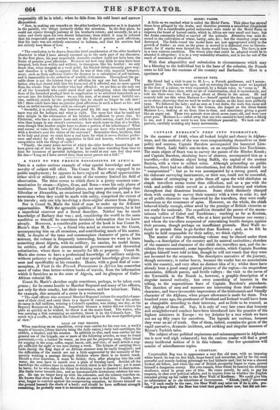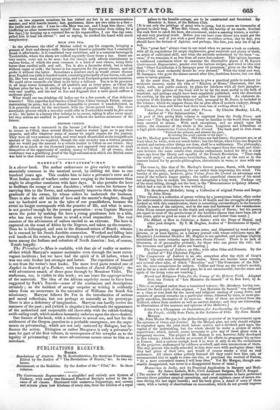CAPTAIN BIIRSLEM'S PEEP INTO TOORKISTAN.
IN the summer of 1840, when all looked bright and cheery in Afghan- istan, and the authors of the war were congratulating themselves on their policy and success, Captaiti Burslem accompanied the lamented Lieu- tenant Sturt, Lady Sale's son-in-law, on an expedition into Toorkistan. The main object of Sturt was to survey the passes of the Ilindoo %omit ; and Captain Burslem, obtaining leave of absence, accompanied him as a traveller,—his ultimate object being Balkh, the capital of the ancient Bactria, with a view to collect coins. Altkough proceeding on public business, Sturt had no official introductions, lest the Politicals should. be " compromised" : but as he was accompanied by a strong guard, and his elaborate surveying instruments, or their use, could not be concealed, the scheme of attempting to palm them off upon the wild chieftains as simple travellers seems worse than ridiculous, and on a par with the trick and artifice which served as a substitute for honesty and wisdom throughout that disastrous business. Some chiefs distinctly charged them with coming to survey their country with a view to seize it; and as all public character was disavowed by the travellers, they were really obnoxious to the treatment of spies. However, on the whole, the chiefs behaved kindly enough, either awed by the prestige of British victories or not ready for outbreak. The expedition threaded the passes of the moun- tainous vallies of Cabul and Toorkistan ; reaching as far as Koolum, the capital town of Meer Weill, who at a later period became our enemy; and whom the travellers suspected of entertaining hostile designs against their persons, though perhaps on insufficient grounds. Meer Walli re- fused to permit them to go further than Koolnm ; and, as he felt he might be held responsible for their safety, we think rightly.
The matter of this unpretending volume may be classed under three heads,--a description of the country and its natural curiosities; sketches of the manners and character of the chiefs the travellers met, and the in- cidents they encountered ; some legendary stories, which Captain Burslem pledges himself were told to him, though he will not vouch that they were not invented for the occasion. The descriptive narrative of the journey, though necessary, is rather heavy, because the reader has no associations with the country, and very often no distinct idea of it ; whilst there have already been a good many general pictures of the region—its stupendous mountains, difficult passes, and fertile valleys : the visit to the caves of the Yeermalik in the Doaub is, however, a graphic description of a singular natural curiosity, but owes something of interest in the telling, to the superstitious fears of Captain Burslem's attendants. The sketches of men and manners are interesting from their dramatic character, and leave favourable impressions of the bonhommie and friendly character of the Afghans, when proper allowance is made for them. Two hundred years ago, the gentlemen of Scotland and Ireland would have been as changeable according to their interests, and as little to be trusted, as any Afghan of them all. Nay, it is only of very late years that honesty and straightforward conduct have been introduced into the practice of the highest ministers in Europe : we try Asiatics by a test which we have not set up fifty years for ourselves. The legends are curious, because they wear an air of truth. One of them, indeed, contains the germ of the rapid narrative, dramatic incidents, and striking and singular manners of Byron's Turkish tales.
The subject of our political supineness and mismanagement in Afghanis- tan is now well nigh exhausted; but the curious reader will find a good many incidental notices of it in this volume. Our few quotations will consist of miscellaneous topics.
A CHIEFTAIN.
Uzzuttoollah Beg was in aypearance a very fine old man, with an imposing white beard: he was six feet high, large-boned and muscular, and by far the most powerful and stately-looking personage we had hitherto met; but he was a shrewd wicked old fellow, and when the star of British prosperity began to wane, proved himself a dangerous enemy. His own vassals, from when he exacted the strictest obedience, stood in great awe of him. He came merely, he said, to pay his respects, to chat over political affairs, and to inquire from us whether the English intended giving up his valley to the Meer Walli of Koolloom. We could give him
no information as to die intentions of Government. Khoob, (well,)" answered he, "if such really be the case, the Meer Walli may seize me if he is able, pro- vided you keep aloof: the Meer has tried that game before now, but did not suc- teed; on two separate occasions he has visited my fort in an unceremonious manner, and with hostile intent; but, gentlemen, there are two sides to a fort— the inside and the out. I was in—the Meer was out, and I kept him there; till, (suffering no other inconvenience myself than the deprivation from riding for a few days,) by keeping up a constant fire on his ragamuffins, I one fine day com- pelled him to beat his retreat": and so saying, he stroked his beard with much complacency. MILK AND TEA.
In the afternoon the chief of Mather called to pay his respects, bringing a present of fruit and sheep's milk: the latter I found so palatable that I constantly drank it afterwards; it is considered very nutritious, and is a common beverage in Toorkisthin, where the sheep are milked regularly three times a day. Goats are very scarce, cows not to be seen; but the sheep's milk affords nourishment in various forms, of which the most common is a kind of soar cheese, being little better than curdled milk and salt. Tea is also a favourite drink, but is taken without sugar or milk; the former is too expensive for the poorer classes, and all prefer it without the latter. Sometimes a mixture such as would create dismay at an English tea-table is handed round, consisting principally of tea-leaves, salt, and fat, like very weak and very greasy soup, and to an European palate most nauseous. We could never reconcile our ideas to its being a delicacy. Tea is to be procured in all large towns hereabouts, of all qualities and at every price; at Cabul the highest price for tea is 51. sterling for a couple of pounds' weight; but this is of very rare quality, and the leaf so fine and fragrant that a mere pinch suffices a moderate party. What would our tea-drinking old ladies say for a few pounds of that delicious treasure? This superfine leaf reaches Cabal from China through Thibet, always maintaining its price; but it is almost impossible to procure it unadulterated, as it is generally mixed by the merchants with the lesser-priced kind. The most acceptable present which a traveller could offer in Toorkisthin would be fire-arms or tea: the latter is a luxury they indulge in to excess, taking it after every meal; but they seldom are enabled to procure it without the lawless assistance of the former.
BRITISH CREDIT.
No sooner was it rumoured in the bazaar [of Koolnm] that we were about to return to Cabal, than several Hindoo bankers waited upon us to pay their respects, and offer whatever sums of money we might require for the journey. They were all very anxious to lend, and were much dissatisfied at the insignificant amount of the cash we required, though the only security was a written promise that we would pay the amount to a certain banker in Cabul on our return. they offered us as much as ten thousand rupees, and appeared very anxious to avail themselves of the opportunity of sending money to Cibul. At all events, their confidence was a gratifying proof of the high estimation in which the British name was held in that remote country.



























 Previous page
Previous page